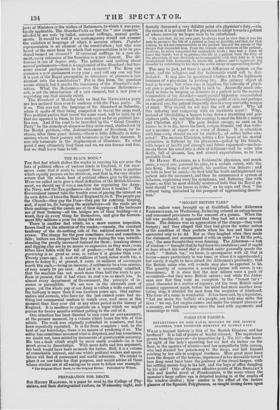THE BLACK BOOK.*
THE first fact which strikes the reader in running his eye over the lists of political offices of various kinds in England, is the enor-
mous sums that it costs to support them ; but there is another which equally presses on his attention, and that is, the very slender return that the whole host of political offices give to the public. Were we called on to give a short definition of the British Govern- ment, we should. say it was a machine for regulating the Army, the Navy, and the Tax-gatherers—for what does it besides ? The Government cannot take the trouble even of paying the interest on its own debt—it hires the Bank of England to do it. The people pay the Church—they pay the Poor—they pay for catching, keeping, and, if need be, for hanging the malefactors—all the roads are of their making—all the canals are of their digging—all the harbours are of their forming—all the bridges are of their building—in a word, they do every thing for themselves, and give the Govern- ment fifty millions a year for doing the rest. There is another fact which, on a more narrow inspection, forces itself on the attention of the reader,—namely, the constant tendency of the do-nothing side of the national account to in- crease. The charge for the poor sometimes rises and sometimes falls; halters are cheaper than they were during the war, notwith- standing the greatly increased demand for them ; breaking stones and digging clay are by no means so expensive as they were ; even tithes have fallen with the fall of produce ;—but the expense of
governing is as great as ever, or rather it is greater than ever. Twenty years ago, it cost 60 millions of bank-notes worth 14s a piece to defray it; at present, it costs 50 millions of sovereigns worth 20s. each,—being an increase, if arithmetic be a true science, of very nearly 20 per cent. And yet it is universally admitted,
that the machine has not much more than half the work to per- form at present, that it had when its cost was so much less. In almost every department of Government, the principle of in- crease is perceptible. We are now in the sixteenth year of peace, yet the whole pay of our Army is within a trifle equal, and the half-pay is more than it was fourteen years ago. Our ambas- sadors and consuls, who have for the last sixteen years had no- thing but commercial matters to watch over, cost more at this moment than they ever did at any other period in the history of England. It is needless to expatiate on a topic which we might pursue for twelve months without getting to the end of it. Our attention has been directed to THE COST OF GOVERNMENT,
at the present moment, by a volume which bears the title of' this article. The work was originally published in numbers, and has
been repeatedly reprinted. It is far from complete ; and, to the
best of our knowledge, there is no means of rendering it so. The editor has sometimes assumed what is disputed, and has sometimes, we doubt not, been misled by documents of questionable accuracy.
Be has a fault which might be more easily avoided—he is too much given to dissertation. With more facts and less argument, his book would have been so much the better. Still, it is a volume of remarkable interest, and one which political writers and specu- lators will find of convenient and useful reference. We intend to place it on our table for that purpose, and would advise all those whose studies are at all analogous to ours to follow our example.
• The Original Black Book, by the Original Editor. Published by Wilson.


























 Previous page
Previous page